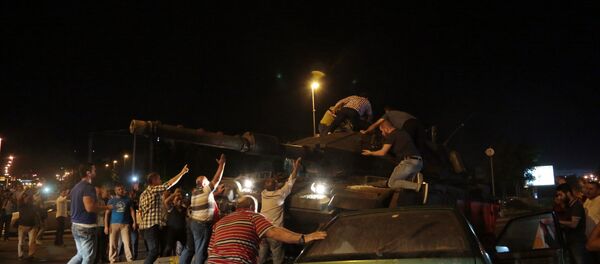The failed coup attempt in Turkey led by a faction of the military seeking the overthrow of President Recep Tayyip Erdogan citing the leader’s abysmal record on free speech, democratic freedoms, and human rights may be the final death knell for both NATO and the European Union who are holding onto the increasingly undemocratic leader for dear life.
European leaders breathed a sigh of relief on Saturday as it averted the chaos of three million additional Syrian refugees flooding into the continent and kept alive a controversial deal with Turkey to help stem the migration crisis that has led to the resurgence of ultra-right nationalism.
The United States, notwithstanding allegations by the Turkish Labor Minister that the coup plot had Washington’s fingerprints all over it, was also relieved to maintain its leading regional partner and a critical component in the NATO security force as Turks managed to repel the government overthrow.
Washington would have been forced under US law to remove its military forces from Turkey, including its fleet of fighter jets at the Incirlik airbase that serves as a critical launchpad for NATO’s missions in Syria, Iraq, and Afghanistan. The United States is barred from providing military aid or stationing troops in any country that has fallen under control of a military coup government.
The West now faces a troubling decision, with President Erdogan expected to crackdown on dissent with more fury than ever before, whether they choose to stand beside an increasingly undemocratic leader for the sake of preservation or whether they ultimately will have to transition their national strategies.
"Erdogan will be judged on his own response," one EU official involved in the migrant deal with Turkey said, citing arrests of judges as an early sign that justified “deep concern that this will lead to a new trampling on rights of freedom of expression and demonstration.”
In total, over 2,745 judges have been arrested along with 2,800 soldiers as the Turkish leader strips away the last semblances of checks and balances within the country.
Germany’s foreign affairs committee chair Elmar Brok predicted that "Erdogan will try to extend his position of power" and French President Francois Hollande said very simply that he expects "repression."
The emboldened Erdogan had already stripped opposition Kurdish parliamentarians of immunity by enacting a constitutional amendment in May leaving many EU lawmakers to worry that the Turkish president will move to imprison these opposition lawmakers under the country’s expanded terrorism code.
Still another EU official said that "clearly Europe would have more reasons to worry if the coup had prevailed," but if Turkey proceeds to imprison peaceful opposition en masse then many European lawmakers signal that they will be forced to oppose the immigration deal that is keeping the European Union together by a thread.
Washington and NATO may have a little less at stake in hoping that Erdogan transitions his government towards a less autocratic format in the wake of the coup attempt, a very unlikely scenario, than German who has already taken in over 2 million Syrian refugees causing widespread anger among voters who feel that their culture is under siege and France which faced yet another attack at the hands of radical Islamic terrorists this week.
However, the image of the United States as a beacon of democracy, the motif carried under the banner of both the American flag and NATO forces, would be ultimately exposed as a myth if Erdogan undertakes a purge of all opposition moving for mass imprisonment or a return of the death penalty.
If Erdogan overplays his cards, Friday’s failed coup may be the final death knell in the coffin of NATO and the European Union or at minimum a major destabilizing force for these leading powers in the global order.






